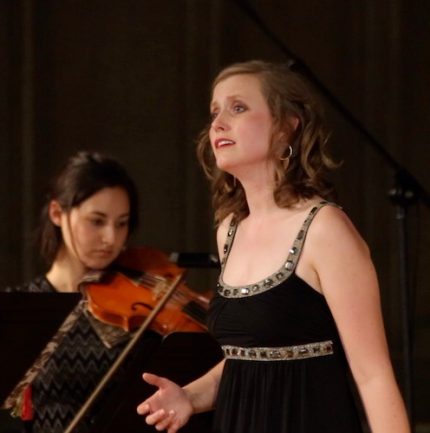Third Coast Baroque opens with a trifecta of sopranos in Handel rarities

Can it really be that Third Coast Baroque is launching its fourth season? It seems like just yesterday that this latest hardy addition to Chicago’s burgeoning Baroque scene was making its debut at the Columbus Park Refectory.
Third Coast Baroque has clearly found its niche, judging by the respectable turnout Saturday night at Chicago Temple for music of Handel in the first of its three season programs. Music of the French Baroque will follow in November with a Vivaldi program on tap for next April.
The opening concert, led by conductor Ruben Dubrovsky, was devoted to Handel’s secular cantatas, with TCB’s three sopranos each taking a turn in the spotlight as solo protagonist.
If the title “Wonder Women” seemed a bit corny, it’s not entirely inapt. Each of the three solo cantatas present a musical portrait of a celebrated woman under siege, the mood centering on foreboding, revenge and dark tragedy. Handel’s rapid alternation of recitatives and da capo arias is often operatic, painting the conflicted emotions of each heroine in vivid, at times, jarring psychological detail.
Nathalie Colas was up first with Armida abbandonata. Her light soprano seemed challenged at times by Handel’s long lines and technical demands, and the virtuosity of “Venti, fermate” emerged rather muted. Yet Colas showed a nicely idiomatic Handel touch and delivered a sympathetic portrait of Armida, the Muslim woman abandoned by her beloved, Rinaldo.
There was no lack of dramatic investment in Erica Schuller’s rendition of Lucrezia. The soprano handled the daunting bravura challenges impressively and conveyed the emotional desperation of the victimized protagonist throughout, bringing vehement fury to her central rage aria (“Il suol che preme”) against her rapist Tarquinius. Lucrezia’s climactic suicide was artfully staged, with Schuller plunging in the dagger with her back to the audience and slowly turning around and dropping red rose petals as if from the wound.
The evening closed with Agrippina condotta a morire. In this most expansive of the cantatas, Kaitlin Foley provided the finest performance of the evening, delivering a superb blend of vocal gleam and fiery dramatic involvement.
The singer’s high, flexible soprano handled the coloratura imprecations with striking ease. Foley brought a scary intensity to the rapid mood swings and mental derangement of Agrippina (understandable when your son is Nero), and conveyed a touching resigned desolation in the quiet coda. Receiving enthusiastic applause for her performance, Foley quickly and graciously called her two soprano colleagues to the stage to share in the ovation.
If conductor Dubrovsky’s halting spoken introductions to the cantatas were somewhat inscrutable at times, his direction of the ensemble was faultless. Balances were impeccable and tempos seemed ideal throughout. The six musicians provided vital and sympathetic backing for the vocal soloists, turning on a dime to fit their mercurial characterizations.
Excerpts from Handel trio sonatas served nicely as preludes for the cantatas, and first violinist Martin Davids’ sweet yet tangy timbre set the tone for the ingratiating sonority of the chamber ensemble at large.
Third Coast Baroque’s season continues with “The French Connection” November 15-17. thirdcoastbaroque.org
Posted in Performances


